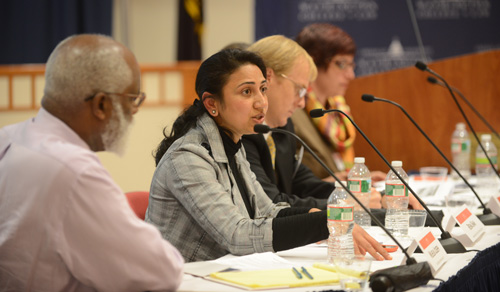Every day, Reena Shah MPA ’03, and a 2007 graduate of the University of Maryland Carey School of Law, seeks to answer a fundamental question: “What do people need to live a life of dignity?”
An attorney, Shah draws on international human rights law to fight for the acquisition of basic human needs in the United States. She is the director of the Human Rights Project at Maryland Legal Aid where she works toward improving outcomes for the poor in Maryland through the application of international human rights law.
While this is a novel approach, it is hardly a simple one. For starters, Shah must educate others – advocates, attorneys and judges – about the parameters surrounding international law. A significant amount of training is involved to teach already overworked attorneys and advocates about how an international law angle could help in securing basic needs like housing.
“We’re in the process of trying to make the use of human rights law in Maryland as easy as possible,” Shah said. “By developing ready-specific and digestible language regarding human rights law, attorneys and advocates could have a better handle on how to utilize this additional legal toolkit. However, it is a continuous battle trying to make sure the judiciary is aware of and receptive to international human rights law being used domestically.”
Shah explained that different human rights are often interconnected. If there is a violation of one human right, there is a chance that other human rights are also being violated. Thus, her organization has adopted a holistic approach in dealing with clients, making sure that they know about their clients’ entire lives, not just the issue that has brought them to her office.
“Clients come in with complex socioeconomic issues. They may come in with a housing issue, but the reason they are losing their housing is because their Social Security check is not coming in, or they have unpaid hospital bills or they just got laid off,” Shah said. “If an individual lacks food or housing or access to health care, all of those issues need to be considered. When you’re dealing with human rights, you have to look at the big picture and consider all of the details.”
 It is this holistic approach that has led to one of Shah’s current projects: a mass statistical study of rent courts in Maryland, the first of its kind. While many Legal Aid attorneys seek relief for their clients in rent courts, most of the tenants in rent court appear pro se, without representation. Because rent courts are places where the case volume is high, trial times short and due process requirements minimal, there is a high risk of unfair outcomes that may lead to too many people falling through the cracks. And if people are evicted because of something improper in rent court, there are not only impacts on the individuals and families being evicted, but also impacts on society at large.
It is this holistic approach that has led to one of Shah’s current projects: a mass statistical study of rent courts in Maryland, the first of its kind. While many Legal Aid attorneys seek relief for their clients in rent courts, most of the tenants in rent court appear pro se, without representation. Because rent courts are places where the case volume is high, trial times short and due process requirements minimal, there is a high risk of unfair outcomes that may lead to too many people falling through the cracks. And if people are evicted because of something improper in rent court, there are not only impacts on the individuals and families being evicted, but also impacts on society at large.
For the individual, everything from their health, their credit, their employment and their children’s education could be impacted. And for society, there is a large moral and economic burden. This is why a proper study analyzing what is going on in rent court is critical and why raising awareness among the judiciary about all the collateral human rights implications necessary.
“We plan to present the study to the judiciary, framing the pattern of improper decisions by the rent courts as a violation of human rights,” Shah said. “This is a different approach than bringing case-specific information to the court’s attention.”
This is in line with Shah’s general approach to issues of human needs – rather than just using local, state or federal law, Legal Aid attorneys are attempting to infuse arguments about social and economic rights into their cases.
To read more about Shah's interest and experience in human rights, click here.


